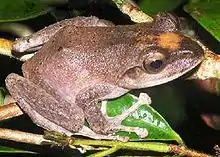Platymantis
Platymantis is a genus of frogs in the family Ceratobatrachidae. They are commonly known as wrinkled ground frogs, ground frogs,[1][2] and forest frogs.
| Platymantis | |
|---|---|
 | |
| Fiji tree frog (Platymantis vitiensis) | |
| Scientific classification | |
| Kingdom: | Animalia |
| Phylum: | Chordata |
| Class: | Amphibia |
| Order: | Anura |
| Family: | Ceratobatrachidae |
| Subfamily: | Ceratobatrachinae |
| Genus: | Platymantis Günther, 1858 |
| Type species | |
| Halophila vitiensis Girard, 1853 | |
As currently defined, Platymantis is a large genus with up to as many as 60 species found mostly in the Philippines. However, it is known to be paraphyletic. Solving this problem will likely lead to a more narrowly defined Platymantis, possibly by transferring some species to a larger Ceratobatrachus (with Batrachylodes).[1]
Species
There are currently at least 30 extant species in this genus.[1] Brown, et al. (2015)[3] estimates that there may be a total of 50-60 species in Platymantis if all cryptic species were to be described.
- Platymantis banahao Brown, Alcala, Diesmos & Alcala, 1997
- Platymantis bayani Siler, Alcala, Diesmos, and Brown, 2009
- Platymantis biak Siler, Diesmos, Linkem, Diesmos, and Brown, 2010
- Platymantis cagayanensis Brown, Alcala & Diesmos, 1999
- Platymantis cornutus (Taylor, 1922)
- Platymantis corrugatus (Duméril, 1853)
- Platymantis diesmosi Brown & Gonzalez, 2007
- Platymantis dorsalis (Duméril, 1853)
- Platymantis guentheri (Boulenger, 1882)
- Platymantis hazelae (Taylor, 1920)
- Platymantis indeprensus Brown, Alcala & Diesmos, 1999
- Platymantis insulatus Brown & Alcala, 1970
- Platymantis isarog Brown, Brown, Alcala & Frost, 1997
- Platymantis lawtoni Brown & Alcala, 1974
- Platymantis levigatus Brown & Alcala, 1974
- Platymantis luzonensis Brown, Alcala, Diesmos & Alcala, 1997
- Platymantis mimulus Brown, Alcala & Diesmos, 1997
- Platymantis montanus (Taylor, 1922)
- Platymantis naomii Alcala, Brown & Diesmos, 1998
- Platymantis negrosensis Brown, Alcala, Diesmos & Alcala, 1997
- Platymantis paengi Siler et al., 2007
- Platymantis panayensis Brown, Brown & Alcala, 1997
- Platymantis polillensis (Taylor, 1922)
- Platymantis pseudodorsalis Brown, Alcala & Diesmos, 1999
- Platymantis pygmaeus Alcala, Brown & Diesmos, 1998
- Platymantis quezoni Brown, Layola, Lorenzo, Diesmos & Diesmos, 2015
- Platymantis rabori Brown, Alcala, Diesmos & Alcala, 1997
- Platymantis sierramadrensis Brown, Alcala, Ong & Diesmos, 1999
- Platymantis spelaeus Brown & Alcala, 1982
- Platymantis subterrestris (Taylor, 1922)
- Platymantis taylori Brown, Alcala & Diesmos, 1999
In addition, there is an extinct species:
- Platymantis megabotoniviti, Giant Fiji ground frog[4]
Species moved to genus Cornufer
Brown, et al. (2015)[3] moved the Platymantis species of Oceania into the newly proposed genus Cornufer. Species in the Philippines remained in Platymantis.
- Cornufer aculeodactylus Brown, 1952
- Cornufer admiraltiensis Richards, Mack & Austin, 2007
- Cornufer akarithyma Brown & Tyler, 1968
- Cornufer batantae Zweifel, 1969
- Cornufer bimaculatus Günther, 1999
- Cornufer boulengeri (Boettger, 1892)
- Cornufer browni Allison & Kraus, 2001
- Cornufer bufonulus Kraus and Allison, 2007
- Cornufer caesiops Kraus and Allison, 2009
- Cornufer cheesmanae Parker, 1940
- Cornufer citrinospilus Brown, Richards, and Broadhead, 2013
- Cornufer cryptotis Günther, 1999
- Cornufer desticans Brown & Richards, 2008
- Cornufer gilliardi Zweifel, 1960
- Cornufer guppyi (Boulenger, 1884)
- Cornufer latro Richards, Mack & Austin, 2007
- Cornufer macrops (Brown, 1965)
- Cornufer macrosceles Zweifel, 1975
- Cornufer magna Brown & Menzies, 1979 (synonym: Platymantis magnus)
- Cornufer mamusiorum Foufopoulos and Brown, 2004
- Cornufer manus Kraus and Allison, 2009
- Cornufer mimica Brown & Tyler, 1968
- Cornufer nakanaiorum Brown, Foufopoulos, and Richards, 2006
- Cornufer neckeri (Brown & Myers, 1949)
- Cornufer nexipus Zweifel, 1975
- Cornufer papuensis Meyer, 1875
- Cornufer parilis Brown & Richards, 2008
- Cornufer parkeri (Brown, 1965)
- Cornufer pelewensis Peters, 1867
- Cornufer punctatus Peters & Doria, 1878
- Cornufer schmidti Brown & Tyler, 1968
- Cornufer solomonis (Boulenger, 1884)
- Cornufer sulcatus Kraus and Allison, 2007
- Cornufer vitianus (Duméril, 1853)
- Cornufer vitiensis (Girard, 1853)
- Cornufer weberi Schmidt, 1932
- Cornufer wuenscheorum Günther, 2006
Endemic ranges
Many Platymantis species are endemic to highly restricted geographical areas within the Philippines.
- Widespread
- Luzon
- Northern Luzon
- Central Luzon
- Platymantis biak: Biak-na-Bato National Park
- Platymantis polillensis: Polillo Island; Aurora Province
- Platymantis mimula: Mount Makiling
- Platymantis banahao: Mount Banahaw
- Platymantis indeprensus: Mount Banahaw
- Platymantis montanus: Mount Banahaw
- Platymantis naomii: Mount Banahaw
- Platymantis pseudodorsalis: Mount Banahaw
- Platymantis quezoni: Quezon Protected Landscape
- Bicol Region
- Visayas
- Platymantis lawtoni: Romblon
- Platymantis levigata: Romblon
- Platymantis insulatus: South Gigante Island near Panay
- Platymantis paengi: Pandan, Antique, Panay
- Platymantis panayensis: Panay
- Platymantis negrosensis: Panay; Negros
- Platymantis hazelae: Negros
- Platymantis spelaea: southern Negros
- Platymantis bayani: Taft, Eastern Samar
- Platymantis rabori: Bohol; Leyte; Mindanao
- Platymantis guentheri: Bohol; Leyte; Mindanao
References
- Frost, Darrel R. (2014). "Platymantis Günther, 1858". Amphibian Species of the World: an Online Reference. Version 6.0. American Museum of Natural History. Retrieved 22 February 2014.
- "Platymantis Günther, 1858". Integrated Taxonomic Information System.
- Brown, Rafe M.; Siler, Cameron D.; Richards, Stephen J.; Diesmos, Arvin C.; Cannatella, David C. (2015). "Multilocus phylogeny and a new classification for Southeast Asian and Melanesian forest frogs (family Ceratobatrachidae)". Zoological Journal of the Linnean Society. 174 (1): 130–168. doi:10.1111/zoj.12232.
- "Platymantis megabotoniviti; holotype (a) paratypes (b-h)". Collections Online. Museum of New Zealand Te Papa Tongarewa. Retrieved 18 July 2010.